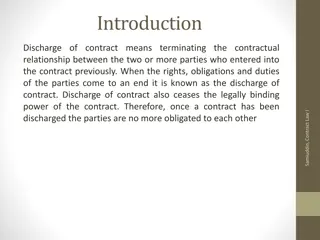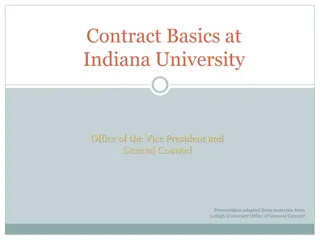
Essential Elements of Contract Law
Explore the essential elements of contract law, including agreement, legal purpose, lawful consideration, capacity to contract, and consent. Understand the definitions and key aspects of forming a valid contract according to the Indian Contract Act, 1872.
Download Presentation

Please find below an Image/Link to download the presentation.
The content on the website is provided AS IS for your information and personal use only. It may not be sold, licensed, or shared on other websites without obtaining consent from the author. If you encounter any issues during the download, it is possible that the publisher has removed the file from their server.
You are allowed to download the files provided on this website for personal or commercial use, subject to the condition that they are used lawfully. All files are the property of their respective owners.
The content on the website is provided AS IS for your information and personal use only. It may not be sold, licensed, or shared on other websites without obtaining consent from the author.
E N D
Presentation Transcript
Introduction to Contract Introduction to Contract By Dr Pankaj Dwivedi Department of Law CSJM University, Kanpur
Definitions Definitions According to Salmond, A contract is an agreement creating and defining obligations between the parties. Sir William Anson defines A contact a legally enforceable agreement between two persons wherein two or more persons get a legal right and some have responsibilities . Sir Fredrick Pollock defines, Every agreement and promise enforceable at law is a contract . to fulfil corresponding legal
Definitions Definitions The term Contract has been defined by Section 2(h) of the Indian Contract Act, 1872. It provides that, An agreement enforceable by law is a contract. According to Section 2(e) of the Indian Contract Act, 1872, Every promise and every set of promises forming the consideration for each other is an agreement. All agreements are not enforceable by law, therefore all agreements aren t contracts. Only those agreements which satisfy the essentials mentioned in Section 10 of the Indian Contract Act, 1872, can be called as contracts. According to Section 10, All agreements are contracts if they are made by the free consent of parties, competent to contract, for a lawful consideration and with a lawful object and are not hereby expressly declared to be void.
Essential Elements of Contract Essential Elements of Contract 1. Agreement - Offer and Acceptance. In order to create a valid contract, there must be a lawful offer by one party and lawful acceptance' of the same by the other party. The adjective lawful means offer and its acceptance must confirm to the rules laid down in the Indian contract act regarding valid offer and acceptance and its communication. 2. Legal purpose- In case, there is no such intention on the part of parties, there is no contract. Agreements of social or domestic nature do not contemplate legal relations. Case:- Balfour vs. Balfour(1919) 3. Lawful consideration: Consideration has been defined in various ways. Consideration is the price for which the promise of another is brought. Consideration is known as quid pro-que or something in return. Consideration is an essential element in a contract.
Essential Elements of Contract Essential Elements of Contract 4. Capacity to contract: The parties to an agreement must be competent to contract. If either of the parties does not have the capacity to contract, the contract is not valid. According to sec 11, the following persons are incompetents to contract. Minors Persons of unsound mind, and Persons disqualified by law to which they are subject.
Essential Elements of Contract Essential Elements of Contract 5. Consent to contract : Consent means the parties must have agreed upon the same thing in the same sense. According to sec 13 two or more person are said to consent when they agree upon the same thing in the same sense. This is called consensus ad idem in English law. According to sec 14 consent is said to be free when it is not caused by Coercion Undue influence Fraud, Miss-representation, Mistake
Essential Elements of Contract Essential Elements of Contract 6. Lawful object: The object of an agreement must be lawful. Object has nothing to do with consideration. It means the purpose or design of the contract. The object is said to be unlawful if- It is forbidden by law It is ofsuchnaturethatpermitted itwoulddefeat theprovisions ofany law Itisfraudulent Itinvolves aninjury totheperson or property ofany other Thecourt regards itasimmoral or opposed topublic policy
Essential Elements of Contract Essential Elements of Contract 7. Certainty : According to Section 29, agreement the meaning of which is not Certain or capable of being made certain are void. For e.g.: A agree to sell to B a 100 ton of oil, there is nothing to show what kind of oil intended, the agreement is void due to the absence of certainty. But if A is dealer of coconut oil only agree to sell B,100 ton of oil, the nature of A s trade is sufficient to show the kind of oil, and this will be a valid contract. 8. Possibility of performance : Condition for a contract should be capable for performance .If the act is impossible in itself, physically or legally, if cannot be enforced at law. For example: If A and B makes an agreement that if B encloses a space with the help of two straight lines then A will pay him Rs. 1000 otherwise B will be liable for paying Rs. 500 to A. RESULT: This is an impossible work. Two straight lines can not enclose a space , hence contract is not valid.
Essential Elements of Contract Essential Elements of Contract 9. Not Declared to be void or Illegal. The agreement though satisfying all the conditions for a valid contract must not have been expressly declared void by any law in force in the country. Agreements mentioned in Section 24 to 30 of the Act have been expressly declared to be void. For example - agreements in restraint of trade, marriage, legal proceedings etc. That is : If A is not willing to marry with B, law can not enforce him/her. 10. Legal Formalities. An oral Contract is a perfectly valid contract, expect in those cases where writing, registration etc. is required by some statute. In India writing is required in cases of sale, mortgage, lease and gift of immovable property, negotiable instruments; memorandum and articles of association of a company, etc. Registration is required in cases of documents coming within the scope of section 17 of the Registration Act. All the elements mentioned above must be in order to make a valid contract. If any one of them is absent the agreement does not become a contract.
Intention to create a legal obligation Balfour v. Balfour (1919) In this case, the defendant was a government servant employed in Ceylon, who went on leave to England with his wife but due to health issues, the wife could not return back to Ceylon with her husband but the husband had promised her to pay a certain amount every month as maintenance for the time period. However, the husband failed to pay this amount, and when his wife sued him for not fulfilling his promise; he contended that there was no such intention to create a legal relationship. Atkin L.J. observed that There are agreements entered into by the parties that do not result in contracts within the meaning of this term in the law. Such agreements are not contracts since the parties did not intend that they should be attended by any legal consequences.
Intention to create a legal obligation Jones v. Padavatton (1969) In this case, an agreement was made between a mother i.e. Mrs. Jones and her daughter wherein the mother agreed to pay a monthly allowance to her divorced daughter during her studies for the bar in England. Mrs. Jones also bought a house in England and the daughter was allowed to stay in a part of it, while the rest of it was rented. But in the meantime, differences arose between both of them and Mrs. Jones brought an action against her daughter to evict the house. But the daughter contended that her mother was legally bound to maintain her until her studies were completed since she had promised to do the same. In this case, the Court held that there was no intention to enter into any legal obligations by either of the parties and therefore, Mrs. Jones s action against her daughter for eviction succeeded.
Intention to create a legal obligation Meritt v. Meritt (1970) Facts: In 1967, Mr. and Mrs. Meritt, a married couple, separated with the intention of getting a divorce. Before their separation, they jointly purchased a house, and it was agreed that Mrs. Meritt would make payments toward the mortgage. After the separation, the couple agreed on the terms of the financial settlement, which were put into writing in a separation agreement. The separation agreement stated that Mrs. Meritt would continue to make the mortgage payments on the house, and in return, Mr. Meritt would transfer the legal title of the property to her. The agreement was signed by both parties, but there was no explicit mention of when the transfer of the legal title would occur. The main issue before the court was whether the written separation agreement constituted a legally enforceable contract and if Mrs. Meritt had the right to claim the legal title to the property. Decision: The court ruled in favor of Mrs. Meritt.
Intention to create a legal obligation Reasoning: The court held that the written separation agreement between Mr. and Mrs. Meritt constituted a legally binding contract. Despite the absence of a specific time frame for the transfer of the legal title in the agreement, the court considered the circumstances and conduct of the parties to determine their intentions. Intention to Create Legal Relations: The court found that the separation agreement demonstrated a clear intention by both parties to be legally bound by its terms. The agreement was not a mere domestic arrangement but a formal contract. Performance of the Contract: Mrs. Meritt had performed her part of the contract by continuing to make mortgage payments on the house, as specified in the agreement. Enforceability: The court emphasized the principle of "equity will not assist a volunteer" which means that a party who receives the benefit of a promise under a contract must fulfill their obligations in return. Since Mrs. Meritt had upheld her end of the bargain by making payments, she was entitled to the legal title to the property.






















